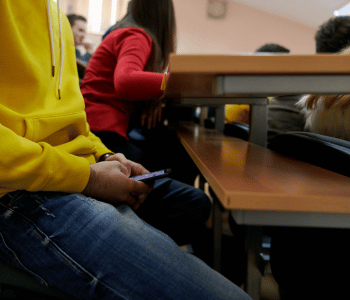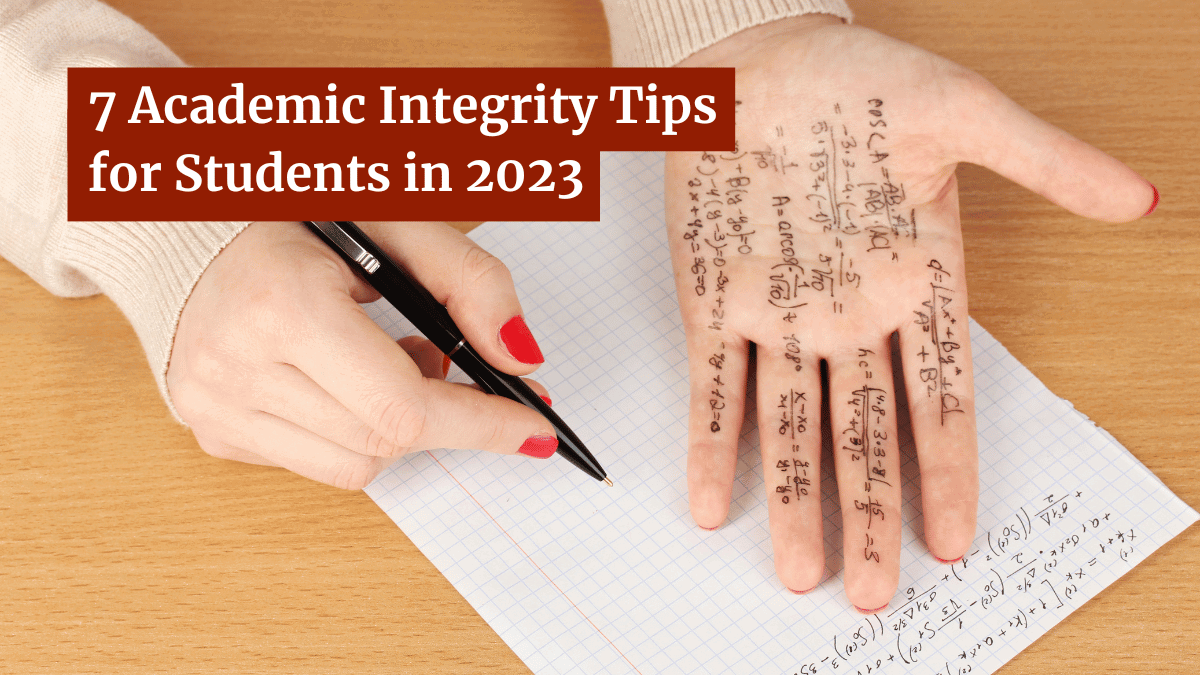7 Academic Integrity Tips for Students in 2023

In the United States, the 2023 school year is either getting ready to start or has already begun. Students of all ages and levels are going back to school, but they are doing so in a very different environment than what existed ten, five or even just one year ago.
As we discussed previously, the major change has been the rising prominence of generative artificial intelligence (AI). Instructors, understandably, have become concerned about academic integrity, naming it the most significant institutional challenge they face.
However, it’s not just instructors who are concerned. Students, have plenty of reasons to share those concerns. Whether it’s concerns that they will accidentally run afoul of their school’s rules, worries about a false accusations or just worried that, if they don’t cheat, they could be left behind.
The good news is that, while things are definitely more complicated, nearly all of the classical advice students are given holds up. To that end, here are a few important tips and suggestions for students as they enter the 2023-2024 school year.
1: Avoid AI
The first tip is also the most obvious. As tempting as it may be to use AI on your assignments, especially given how difficult it is to detect reliably, it is still a bad idea.
Even if AI-generated content is undetectable, it is still highly untrustworthy. Trust in ChatGPT and similar systems is already falling, and we’ve seen repeated issues of an AI making up facts and citations, such as a lawyer who cited six non-existent cases in an AI-generated filing.
Despite the difficulties in detecting AI writing, students are still regularly caught using it. Trusting an AI with your grade is simply not wise, and editing/vetting AI work enough to make it trustworthy may take as much or more time than simply writing the essay yourself.
The exception to this rule is if the assignment specifically asks you to use AI or allows the use of AI. In those cases, do make use of it, but do make note of the weaknesses and limitations with the work generated by such systems.
2: Use Word Processors with Versioning
The rise of generative AI, the concern over cheating, the difficulties detecting it and the complexities of the technology create an environment where plagiarism and cheating allegations will be more common and will, at times, be wrong.
As we discussed in May, one of the best ways to defend yourself against a false accusation of plagiarism is to make sure that the software you’re using supports versioning. This makes it easy for someone to come behind you and see how the paper was written.
Fortunately, most word processors have versioning, including Google Docs and Microsoft Word. However, it’s important to ensure that whatever you use to write your essays has this feature. It’s a small thing, but it can be invaluable if you’re asked to prove you wrote a paper.
3: Communicate with Your Teachers
Inevitably, you’re going to have questions about what is and is not allowed on a particular assignment. It could be as simple as what citation format to use, or as nuanced as seeing how much help is acceptable from outside sources.
Either way, if you have such questions (and they aren’t answered in your syllabus or other class documentation) ask your instructor. Communication with your teachers and graders is key.
Digital communication is often the best simply because it is more immediate and creates a record, but it’s also not a bad idea to get face time with your instructors.
Remember, they are there to help you learn and thrive, but that effort has to be collaborative. One key way to contribute your part is to ask questions and interact with your instructors when you can.
4: Be Wary of the Contract Cheating Industry
Though it may seem like AI should have destroyed the contract cheating industry by now, it is still very much there. There are no shortage of sites that will offer to write your paper for you, to take exams for you (both digitally and in person) and sites that offer answers to exam questions.
However, be wary of these sites and services. As we’ve seen before, the contract cheating industry is actively exploitative, one that often manipulates or even tricks students into ordering services that, in turn, are often low-quality and can even lead to blackmail.
We’ve seen this a great deal with “Exam Help” scammers, who often trick students into paying for a service and then hitting them up for larger and larger amounts of money to either secure their silence or otherwise prevent the student from getting caught.
Simply put, scammers love the contract cheating industry. The victims are young, often wealthy, and can’t really do anything about the scam. Because of this, they are amazingly aggressive with their marketing, even going as far as infiltrating supposedly private class chats and groups that are meant to help students collaborate in a specific class or subject.
5: Homework Help Sites Aren’t
There are a slew of “Homework Help” websites that purport to provide resources to help students do better in classes. This includes sites like Course Hero, Chegg, Quizlet and a myriad of others.
However, the main draw for these websites is ways for students to cheat on assignments. This includes answers to previous tests (including from textbooks), previous essays and much more.
While the appeal of such sites is obvious, it’s a temptation best ignored. The reason is simple, teachers and schools are also aware of these sites and, as we’ve seen before, some are even manipulating the data uploaded to them to catch cheaters.
Students would be wise to treat these sites with suspicion, because even their own terms of service make it clear that they do not attest to the veracity of the information on it. It’s an easy way to get caught or to get bad information.
6: Use the Cleanroom Writing Method
One tip that never goes out of fashion is, when writing your papers, always use the cleanroom writing method.
The rules are remarkably simple, never mix original and outside text into the same document. Make sure that your notes, sources and other information are elsewhere and that anything you do paste in is cited immediately.
In short, keep your writing separate, cite as you write (not as you edit) and be careful to ensure that citation remains intact as you complete the project.
If you do that, plagiarism, in particular verbatim plagiarism, should be impossible. Simply having that wall between your work and the outside world can prevent you from making mistakes that lead to plagiarism accusations.
Avoiding plagiarism is easy, it just involves changing the way that you write.
7: If You Need Help, Seek Help
Finally, if you’re struggling in a class or on an assignment, seek help. If you’re at a university, there’s likely a student success center or something similar that you can go to for help. You can also seek out school-endorsed tutoring or writing help services.
Much of this comes back to point three, your teachers want you to succeed and communicating your difficulties with them gives them a chance to help you or at least point you in the direction of something that can. They can also give breaks, extend deadlines and take a specific situation under advisement when grading.
The important thing is that, the time to seek help, is the moment you realize you need it or would benefit from it. The longer you wait, whether for one assignment or for an entire course, the more tempting and seemingly necessary it becomes to cheat.
Bottom Line
In the end, a lot of this advice isn’t earth-shattering, and most of this advice would work just as well five or ten years ago. However, that’s for a simple reason: Even amongst all the turmoil caused by generative AI, the ways to avoid academic integrity issues don’t change.
Don’t cheat on tests, write your own papers, cite your sources and follow your instructor’s directions may not be glamorous pieces of advice, but they are effective.
In times of upheaval, many are best served by focusing on fundamentals. Though learning about AI is an important thing to do, when it comes to classwork, there’s no substitute for doing your own work and doing it well.
No matter what the future holds when it comes to AI, its use in the classroom right now this school year will be determined by schools and instructors. As such, it’s important to follow their lead, lest you find yourself accused of plagiarism.
While there are times being on the cutting edge is great, other times that edge ends up hurting those that are attempting to ride it.
Want to Reuse or Republish this Content?
If you want to feature this article in your site, classroom or elsewhere, just let us know! We usually grant permission within 24 hours.
